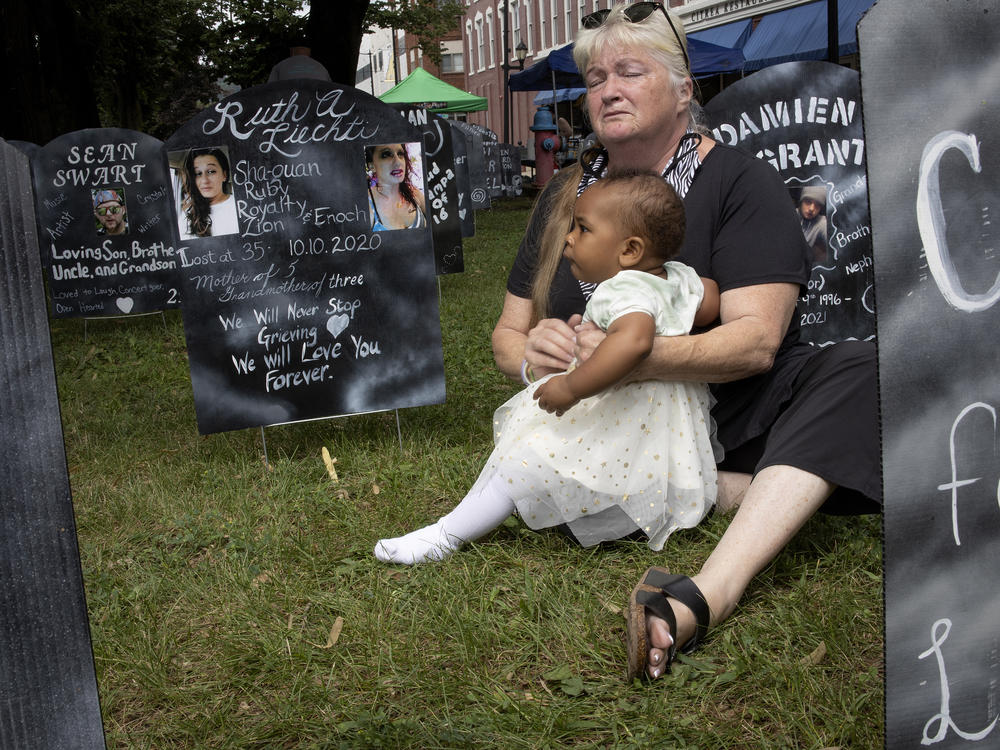Section Branding
Header Content
In a decade of drug overdoses, more than 320,000 American children lost a parent
Primary Content
More than 320,000 children across the United States lost a parent due to a drug overdose between 2011 and 2021. That's according to a new study published in JAMA Psychiatry Wednesday.
"It's a call to arms to pay close attention to the consequences of a parent who dies due to a drug overdose," saysHarvard neuroscientist Charles Nelson III, who wasn't involved in the new study.
The impact of the country's overdose epidemic on children is something "we really don't speak much about," says Dr. Nora Volkow, director of the National Institute on Drug Abuse and an author of the new study.
"The [overdose] numbers and mortality are so high that it attracts all of the attention and urgency to address it, to protect people from dying," she adds. "But at the same time, we've basically neglected to realize that when someone dies, there is a family that's left behind. And if the family has young children, that makes them very, very vulnerable."
Several federal agencies including the Substance Abuse and Mental Health administration and the US Centers for Disease Control and Prevention conducted the study.
Kids who experience the death of a parent or a primary caregiver are at risk of a range of poor health and educational outcomes, according to previous research.
For example, the death of a parent makes children more likely to do poorly at school and even drop out. A 2018 study found that children who experienced the sudden death of a parent are more likely to have trouble functioning and have symptoms of depression and post traumatic stress disorder.
The new paper was inspired by recent studies on estimates of children who lost a parent or primary caregiver to Covid-19, says Volkow, drawing attention to the multigenerational effects of the pandemic.
Volkow and her co-authors found that the rate of children who lost a parent from an overdose rose by 134% during the study period – from 27 per 100,000 children in 2011 to 63 per 100,000 in 2021.
More children — over 192,000 — lost a father to drug overdose compared to the 129,000 who lost a mother.
More than half of these bereaved kids had parents who died between the ages of 26 to 40 years, followed by 41 to 64 years, and 18 to 25 years.
The largest number of parents who died were non-Hispanic White, followed by Hispanic and Black. However, the highest rate of parental drug overdose losses were among American Indian and Alaska Native children.
"Children that come from underrepresented groups with higher adversity, economic and social, which already puts them at higher risk for behavioral health disorders and mental health disorders," says Volkow. Those risks can be further exacerbated by the death of a parent due to overdose, she adds.
"When I read the [new] paper, I had this sense of déja vu," says Nelson, who is an author of a 2021 study that estimated the number of children in the United States who lost a parent due to COVID-19-related causes.
However, the long term risks may be even greater for kids who lost a parent due to a drug overdose, says Nelson.
"There's so many factors involved so that kids could get very, very tangled up in their thinking about why their parent overdosed," says Nelson.
For example, a child might get preoccupied with questions like "Was it preventable? Why did my father do this? Why didn't they stop taking drugs?" he says.
Besides, as the study points out, growing up in a household where a parent uses substances is itself a childhood trauma with potential for long-term health consequences for a child. "There's all the neglect that goes along with that, with certain substances. That's very common," says Nelson. "There is the abuse that sometimes travels with that."
As a result, a child whose parent died from a drug overdose may experience complex grief, and need more specialized mental health care, he adds.
There are other factors adding more stress to the lives of these bereaved children, says Nelson. "The worst of it is the stigma associated with having lost a parent to an overdose," he says. "So that would mean that these kids could be stigmatized in school."
Then there is the risk of future substance use. "As these kids get to adolescence, they too might start using drugs," says Nelson. "It gets really complicated."
Volkow hopes the study will spur actions to better address the needs of these children, so their long-term risks can be minimized. For example, she hopes there will be efforts made to keep children with their siblings and/or other relatives, with families receiving the supports and services they need to address these children's mental health needs.
"If a child loses a parent, [and] the child welfare system comes in and they remove them and take them away from other siblings, and then they lose not just the parent, they lose the sibling, they lose the school system that they have," says Volkow.
And there is a lot more to be done to prevent the death of parents due to overdoses in the first place, says Volkow, through policies that encourage parents to seek treatment for their substance use.
However, parents, especially mothers (and pregnant women) face tremendous stigma and punitive state laws which discourage them from seeking treatment, she says.
'As a physician, if someone comes to me and they are actually taking drugs and say they are pregnant, I have to report that," Volkow says.
In some states, such reporting eventually leads to the child being taken away from the mother soon after birth. Laws like these discourage women from seeking treatment for substance use, she adds. "Seeking treatment should not be something that people should be afraid of."


